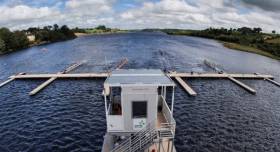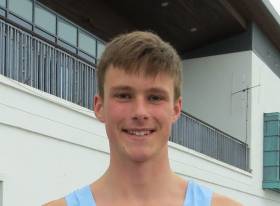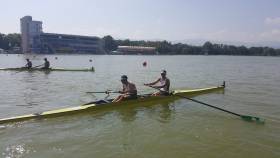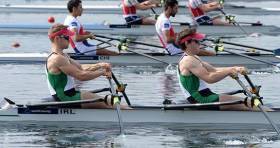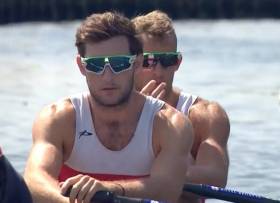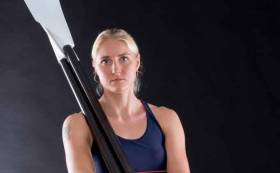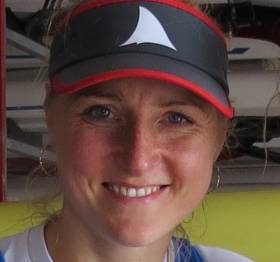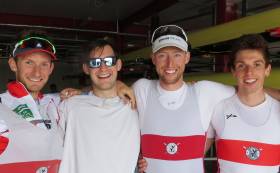Displaying items by tag: rowing
Rowing Ireland Trial Cancelled at Farran Wood Due to Bad Weather Forecast
#Rowing: The Ireland Trial set for tomorrow, Saturday, at the National Rowing Centre at Farran Wood in Cork has been cancelled because of bad weather. No plan for Re-scheduling has been announced.
Shandon Sculler Dorney Wins In Boston
#Rowing: Ireland’s Jack Dorney came in fastest of 36 starters in the Men’s Youth Singles at the Head of the Charles Regatta in Boston.
Mark O’Donovan and Shane O’Driscoll placed eighth in the Directors Challenge Men’s Quadruple, while O’Driscoll and O’Donovan were seventh in the Championship Double. Shannon took second in the Men’s Masters Eight.
The Trinity men’s eight finished 11th in the Club Eight despite starting at the back of the field.
Gary O’Donovan, who entered the men’s Championship Single, did not travel.
Good Start but Doyle and Byrne Miss Out on A Final at World Championships
#Rowing: Ireland’s Philip Doyle and Ronan Byrne took fifth in their semi-final at the World Rowing Championships in Plovdiv, Bulgaria this morning. They will compete in the B Final for places six to 12. The top three took A Final places and Ireland actually led through the first 500 metres. Britain’s Angus Groom and Jack Beaumont took over the lead and built it. They would go on to win. The Irish crew were still their nearest challengers at halfway, but from there New Zealand took over in second and held it. Ireland stayed well in it, but were passed by Romania and Poland. The Romanians took third.
In the first race of the day, the Britain women’s eight squeaked through to the A Final by taking the fourth of four qualification places in their repechage – by .16 of a second from New Zealand. Rebecca Shorten from Belfast is the stroke woman for the crew.
World Rowing Championships, Plovdiv, Bulgaria, Day Six (Irish interest)
Men
Double – Semi-Final One (First Three to A Final; rest to B Final): Britain 6:06.59, 2 New Zealand 6:08.00, 3 Romania 6:08.17; 5 Ireland (P Doyle, R Byrne) 6:10.95.
Women
Eight – Repechage (First Four to A Final): 4 Britain (8 R Shorten) 6:04.63.
O'Donovans Qualify for World Championship Final with Third Place
#Rowing: Paul O’Donovan and Gary O’Donovan finished third in their semi-final and qualified for the A Final of the lightweight double sculls at the World Rowing Championships in Plovdiv. Italy were the early leaders and held on even as the O’Donovan brothers produced a good middle third. Coming up to the line, Belgium found a big finish and took second, while Ireland held off Poland to qualify.
World Rowing Championships, Plovdiv, Bulgaria, Day Five (Irish interest)
Men
Pair – Quarter-Final Four (Three to A/B Semi-Finals; rest to C/D Semi-Finals): 1 Canada 6:26.04, 2 New Zealand 6:30.36, 3 Czech Republic 6:35.01; 5 Ireland (M O’Donovan, S O’Driscoll) 6:44.28.
Double Sculls – Repechage Four (First Two to A/B Semi-Final):
Ireland (P Doyle, R Byrne) 6:16.96, 2 Bulgaria 6:20.15.
Lightweight Double – Semi-Final Two (Three to A Final; rest to B Final): 1 Italy 6:21.94, 2 Belgium 6:22.83, 3 Ireland (G O’Donovan, P O’Donovan) 6:23.78.
Women
Pair – Semi-Final (Three to A Final; rest to B Final): 1 Ireland (A Keogh, E Hegarty) 7:14.67, 2 Italy 7:14.99, 3 Spain 7:15.30.
Thrilling Win by O'Donovans at World Rowing Championships
#Rowing: Paul O’Donovan and Gary O’Donovan won a thrilling quarter-final of the lightweight double sculls at the World Rowing Championships in Plovdiv, Bugaria.
The Ireland crew were fourth at 500 metres and third behind New Zealand and Norway at half way. But the Skibbereen men produced a brilliant second half to pass both crews and win – beating New Zealand by just six-tenths of a second.
The lightweight quadruple of Fintan McCarthy, Ryan Ballantine, Jake McCarthy and Andrew Goff became the first Ireland crew to qualify for an A Final with a steady second place behind Turkey in their repechage.
Monika Dukarska and Aileen Crowley hoped to stay on course with a top three place in their repechage, but they could only finish fifth and go to C/D semi-finals.
Racing was later suspended.
World Rowing Championships, Plovdiv, Bulgaria, Day Four (Irish interest)
Men
Lightweight Quadruple Sculls – Repechage One (First Two to A Final): 1
Turkey 5:51.12, 2 Ireland (F McCarthy, R Ballantine, J McCarthy, A
Goff) 5:54.09
Lightweight Double Sculls – Quarter Final Three (First Three to A/B
Semi-Finals; rest to C/D Semi-Finals): 1 Ireland (G O’Donovan, P
O’Donovan) 6:44.44, 2 New Zealand 6:45.04, 3 Norway 6:46.70.
Ireland Rowing Team Picked for Lucerne World Cup
#Rowing: The Ireland team for the World Cup Regatta at Lucerne from July 13th to 15th has been announced. There will be two men’s heavyweight pairs, as Patrick Boomer and Andy Harrington join Mark O’Donovan and Shane O’Driscoll. Philip Doyle will compete in the open single sculls.
Sanita Puspure (silver) and the lightweight double of Paul O’Donovan and Gary O’Donovan (bronze) both had podium finishes at the first World Cup in Belgrade and will compete again. The women’s double of Monika Dukarska and Aileen Crowley also win their place and a women’s four or pair will be announced after a trial in the coming days.
Ireland Team for World Cup Regatta, Lucerne, July 13th to 15th
Men
Pair: M O’Donovan, S O’Driscoll; A Harrington, P Boomer
Lightweight Double: G O’Donovan, P O’Donovan
Single Sculls: P Doyle
Women
Pair or Four: to be chosen
Double: M Dukarska, A Crowley
Single Sculls: S Puspure
#Rowing: The Ireland teams for the Under-23 and Junior World Rowing Championships have been chosen. The U23 World Championships will be held from July 25th to 29th in Poznan, Poland. The Junior World Championships will be held in Racice in the Czech Republic from August 9th to 12th.
Ireland Under-23 Rowing Team:
Men
Pair: Shane Mulvaney, David O’Malley
Lightweight Quadruple: Niall Beggan (Commercial), Miles Taylor (QUBBC), Ryan Ballantine (Portora-Newcastle), Andrew Goff (UCD)
Lightweight Double: Jake McCarthy, Fintan McCarthy (Skibbereen)
Lightweight Single Sculls and Reserve: Hugh Sutton (UCC)
Single Scull: Ronan Byrne (UCC)
Women
Pair: Emily Hegarty, Tara Hanlon (UCC)
Lightweight Double: Lydia Heaphy (Skibbereen), Margaret Cremen (Lee RC)
HPD: Antonio Maurogiovanni
Coaches: Dominic Casey, David McGowan, Paul Thornton
Team Manager: Paul Thornton
Ireland Junior Team
Men
Quadruple: Jack Keating (Carlow), Jack Dorney (Shandon), Luke Hayes-Nally (Shandon), Alex Byrne (Shandon)
Four, coxed: Eoin Gaffney (Shandon), Conor Mulready, James O’Donovan (Castleconnell), Fintan O’Driscoll. Coxswain to be announced.
Women
Pair: Gill McGirr, Eliza O’Reilly (Fermoy)
Double: Ciara Moynihan, Ciara Browne (Workmen's)
HPD: Antonio Maurogiovanni
Coaches: Ray Morrison and Fran Keane
Team Manager: Michelle Carpenter
Puspure Opens With Commanding Win at World Cup Rowing
#Rowing: Sanita Puspure booked her places in the semi-finals of the World Cup in Belgrade with a commanding win in her heat. The Ireland single sculler had a slight lead by the 500 metre mark over Diana Dymchenko of the Ukraine. Puspure extended her advantage by halfway and then moved clear in the second 1,000 metres. Carling Zeeman of Canada tried to push into the second – and final – qualifying spot but could not get past Dymchenko, who finished almost nine seconds behind Puspure.
World Cup Regatta, Belgrade (Irish interest)
Men
Pair – Heat Four (Winner to A/B Semi-Finals; rest to repechage): 1 Czech Republic 6:41.22; 2 Spain 6:48.03, 3 China One 6:51.79, 4 Ireland (M O’Donovan, S O’Driscoll) 6:51.91.
Women
Pair – Heat One (First Three to A/B Semi-Finals; rest to repechage): 1 Britain One 7:19.05, 2 Britain Two 7:22.92, 3 Ireland (A Keogh, E Hegarty) 7:23.77.
Double Sculls – Heat Three (First Three to A/B Semi-Finals; rest to repechage): 1 Netherlands 7:10.90, 2 China One 7:16.89, 3 Ireland (A Crowley, M Dukarska) 7:20.40.
Single Sculls – Heat One (First Two to A/B Semi-Finals; rest to repechage): 1 Ireland (S Puspure) 7:50.48, 2 Ukraine (D Dymchenko) 7:59.30.
#Rowing: Mark O’Donovan and Shane O’Driscoll took fourth in their heat of the pair at the World Cup Regatta in Belgrade this morning. Only the winner nailed down a place in the semi-final and the Czech Republic took this after a battle with Spain. Well behind them, China One won their battle with O’Donovan and O’Driscoll.
The Irish, the world champions in the lightweight pair, are hoping to establish themselves as a heavyweight pair. They were 13th of the 22 contenders on time.
World Cup Regatta, Belgrade (Irish interest)
Men
Pair – Heat Four (Winner to A/B Semi-Finals; rest to repechage):
1 Czech Republic 6:41.22; 2 Spain 6:48.03, 3 China One 6:51.79, 4 Ireland (M O’Donovan, S O’Driscoll) 6:51.91.
Women
Pair – Heat One (First Three to A/B Semi-Finals; rest to repechage): 1 Britain One 7:19.05, 2 Britain Two 7:22.92, 3 Ireland (A Keogh, E Hegarty) 7:23.77.
First Outing for O'Driscoll and O'Donovan as Heavyweights in New Zealand
#Rowing: Mark O’Donovan and Shane O’Driscoll competed as a heavyweight pair at the North Island Championships in New Zealand today. The world champions in the lightweight pair, who have switched to heavyweight in the hope of competing at the 2020 Olympic Games in Tokyo, finished fourth in their heat.
Paul O’Donovan and Gary O’Donovan both finished sixth in their heats of the single sculls. Both also competed as heavyweights.
All three boats move into repechages on Sunday.


























